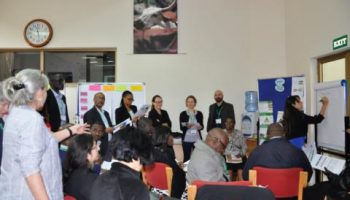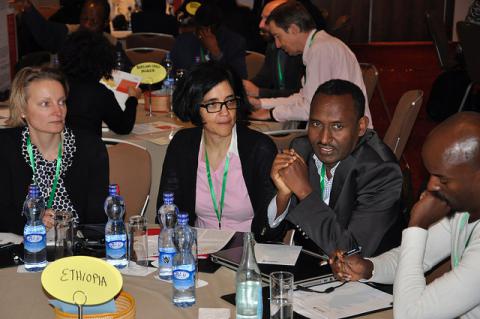Posted on July 24, 2017 by Mariangela
Resilience for smallholders food security in sub-Saharan Africa
Challenges to agricultural production and food security in Africa have been widely documented. In order to tackle them, the Global Environment Facility has recently launched a IAP program to foster sustainability and resilience for food security. ESA’s EO4SD – Rural and Agriculture Development project will contribute to this program by providing Earth Observation services and capacity for agricultural and land degradation monitoring at national and regional level.
In an effort to tackle challenges such as population growth, land degradation, loss of biodiversity and effects of climate change, more than 80 government representatives and development sector experts gathered in Addis Ababa, Ethiopia, on 5 July 2017, to launch the Integrated Approach Program on Fostering Sustainability and Resilience for Food Security in Sub-Saharan Africa (IAP-FS).
The 5-year program is funded by the Global Environment Facility (GEF) to promote sustainability and resilience among smallholder farmers through the sustainable management of natural resources – land, water, soils, among others – that are crucial for food and nutrition security.

The IAP-FS Program launch was followed by a two-days workshop.
Smallholder farmers, who are responsible for the majority of the Sub-Saharan food production, will benefit from practices and policies that will ensure the long-term sustainability and resilience of their production systems. Efforts to ensure post-program sustainability include a particular focus on gender issues at every level of the program to address policy and culturally-related barriers to gender equality and women’s empowerment in most of the participating countries.
The program targets almost three million households in 12 countries in Africa (Burkina Faso, Burundi, Ethiopia, Ghana, Kenya, Malawi, Niger, Nigeria, Senegal, Swaziland, Tanzania and Uganda) located in the dryland regions where the threats of environmental degradation and food insecurity are greatest. Overall, it will focus on improving the management of 10 million hectares of land.
As ESA’s EO4SD – Agriculture and Rural Development project is committed to supporting this program, representatives from ESA and the EO4SD cluster (ITC-University of Twente and DHI GRAS) attended the launch event. The Agriculture and Rural Development cluster activities will complement those of Conservation International and its Vital Signs program, which have been entrusted to monitor and assess the overall impact of the IAP program. The EO4SD project will contribute with EO-based information on biomass production, agricultural water productivity, water consumption and deficit and soil erosion potential from water, for monitoring sustainable and integrated land management and ultimately inform the Program-Level Indicators.
EO-based technology is exceptionally well suited to support the implementation of long-term and large scale development programs, which resolve the data and information gaps concerning agricultural and land degradation monitoring. Such EO services can provide independent and authoritative information in order to build up a stronger Indicator Framework which can demonstrate how different IAP program investments are addressing drivers of environmental degradation and agro-ecosystem resilience, delivering food security outcomes and generating global environmental benefits.

During the two-day workshop representatives of the EO4SD-Rural and Agriculture Development project presented the benefits of using Earth Observation data for agricultural and land degradation monitoring.
The launch event was followed by a 2-day workshop with intense discussion sessions where participants dug into the different components of the program, such as monitoring and evaluation. In addition, it particularly addressed the necessity of fostering the idea of an integrated approach of information exchange among countries. The EO4SD project actively contributed to the discussions and used the opportunity for stakeholder engagement and knowledge sharing on EO4SD as well as raising awareness of the use of EO for the collection of indicators for project monitoring activities.
The IAP-Food program is led by the UN International Fund for Agricultural Development (IFAD) and coordinated with six other GEF Agencies (UNEP, FAO, UNDP, World Bank, Conservation International and UNIDO).
See more pictures of the event: Event photos
